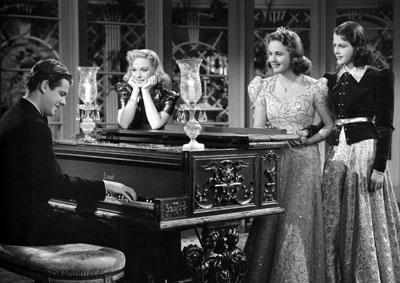Directed by Henry Koster
In this coming-of-age comedy set in glittering New York high society, Deanna Durbin stars as the precocious Penny, the youngest of the three Craig sisters. Soon after eldest sister Joan (Nan Grey) announces her engagement to the flawless, refined Richard Watkins (William Lundigan), Penny discovers that her other sister, Kay (Helen Parrish), secretly loves Joan’s fiancé and is heartbroken over the proposed marriage. Seeking to remedy the situation and assuage her sister’s sorrows, Penny conspires to have Kay fall in love with another young man, and her hunt for Mr. “Tall, Dark and Handsome” begins.
Penny finds the musician Harry Loren and invites him to their palatial house. Penny’s contrived efforts to draw Harry’s attention towards Kay prove to be in vain. The magnetism between the dynamic Harry and the beautiful Joan, however, is immediately apparent. A series of difficulties and misunderstandings arise as Penny, “Little Miss Fix-It,” plays the role of matchmaker. Penny looks to her father, the absentminded businessman Judson Craig, for guidance, but the Wall Street wizard is oblivious when it comes to his own family affairs. (Still, Dad ultimately learns his lesson and saves the day, reaffirming the notion that “father knows best.”) Throughout it all, the bright Craig sisters find themselves stumbling into the realm of adulthood, as they make sense of amorous feelings and undergo conflicts which test their sibling loyalty.
Family matters are at the heart of this charming, tender sequel to Three Smart Girls (1936), which made the youthful Durbin a major Universal star. In the bitter Depression years, Durbin helped the studio stay afloat, delighting audiences with her sunny disposition and pleasant, unaffected style of operatic singing. Her on-screen persona as the tenacious girl with wholesome values and beaming optimism easily made her America’s sweetheart. Director Henry Koster’s Three Smart Girls Grow Up breezes along effortlessly thanks to its smart dialogue, amiable personalities, and light musical numbers, including Durbin’s rendition of the old standard “Because.” The film unfolds seamlessly as we glide through the world of opulent soirees and upscale nightclubs, while still grounded by its central, family-friendly themes.
—Jennifer Rhee
Universal Pictures. Producer: Charles R. Rogers, Joseph Pasternak. Screenwriter: Adele Comandini. Cinematographer: Joseph Valentine. Editor: Ted Kent. Cast: Binnie Barnes, Charles Winninger, Nan Grey, Barbara Read, Deanna Durbin.
35mm, b/w, 90 min.






 Mobile Navigation
Mobile Navigation

